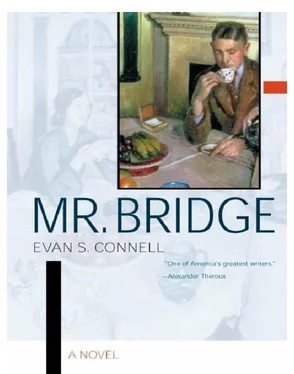Rodney Vandermeer and Douglas were expelled from school for two days. They had run amuck for no comprehensible reason. First, they had rushed into the girls’ dressing room in the gymnasium, shouting and terrorizing the little girls. Summoned to the office of the principal and severely reprimanded, they were contrite. But at lunchtime they had somewhere found a box of F.D.R. campaign buttons; they bent the pins straight up and scattered the buttons on the classroom seats. Again they were taken to the principal, who ordered them to bring their mothers to school for a talk. But they were no sooner released from the office this time than they ran around to the rear of the building and urinated against the wall, in plain view of the policeman at the corner.
Mrs. Bridge was bewildered. Mr. Bridge listened silently to her account of everything that happened. He could not make sense of it either. He said he would have a talk with Douglas.
Douglas was brought into the study, but he did not know why they had done what they had done. He mumbled, he scratched his neck, he picked at the braces on his teeth, he scraped his shoes together, examined the pencil he was carrying behind his ear, and could not explain. He did not even remember whose idea it was to invade the girls’ dressing room, nor could he remember which of them had first thought about the campaign buttons. They had just felt like doing it, that was all.
The buttons were serious. The other two acts were foolish and vulgar, but if one of the children had seated himself on a pin there would have been real trouble.
“Somebody might have been badly injured,” Mr. Bridge said. “Weren’t you aware of that?”
“We only left them in the girls’ seats,” Douglas answered.
And suddenly the various outrages were linked. It was not incomprehensible after all, only a little bizarre.
According to Douglas there were a number of worthwhile things one could get in exchange for cereal boxtops, and in his room in the bottom drawer of his desk where valuable possessions were kept, along with a Roman candle left over from the previous Fourth of July, a bottle of nails, a deflated rubber basketball, a bronze coin bank in the shape of a book with a leatherette cover, and other choice items — there in the bottom drawer he maintained a cache of boxtops. From time to time, when he had accumulated enough, he would mail some of these boxtops to the company and in about ten days would receive the premium. He had gotten a balsawood glider kit which he had assembled, but the glider lodged high up in an oak tree on its maiden flight and was still to be seen months later. He had gotten a mustard-colored ocarina, known as a “sweet potato,” on which he played unrecognizable melodies. He had gotten a Tom Mix cap pistol with a glaring red holster, but had mislaid the gun so that now he had only the holster. He had gotten a pair of aluminum spurs which dragged the ground whenever he attached them to his tennis shoes, and a horsehair lasso, and a fishing reel — the line was now irrevocably snarled — and a bicycle pump that leaked, and a reproduction of Custer’s Last Stand . He had in mind several other premiums. He desperately wanted a blowgun with six darts, a battery-powered model of Sir Malcolm Campbell’s Bluebird , a periscope, an incense burner, and most of all a fur-lined aviator’s helmet with tinted goggles.
Nobody else in the family saved boxtops; even so, it took a long time to get a premium. He had been considering this, together with the fact that in almost every house in the neighborhood somebody ate cereal, which meant, presumably, that hundreds of boxtops were going to waste. If he could get hold of these boxtops he could order most of the premiums in the catalog. The question was how to get them. At first he thought of going from house to house asking for them, but the idea of ringing doorbells and explaining what he wanted was embarrassing. Finally he decided to follow the trash collectors who came around every two weeks.
He did not mention this to his friends Tipton and Vandermeer, because they might cut in on the route; nor was there any point in mentioning it at home, either to his parents or to his sisters or to Harriet. If his mother or his father found out what he was doing there might be trouble. He did not think there was anything wrong with the plan, but just the same he did not mention it.
Every other Saturday morning as soon as he had finished breakfast, without telling anybody where he was going he went out the kitchen door, jumped the hedge, and trotted away. He cut through the vacant lot, climbed the fence behind the Edison house, trotted down their driveway, crossed Stratford Road, and at the corner of Fifty-ninth Street he squatted beside one of his favorite telephone poles to wait for the truck.
He came home in time for lunch, with his pockets bulging.
At first he felt uncomfortable as he followed the truck through the neighborhood, but after several trips he began to feel that the trash collectors accepted him, and after a while he learned their names — Vince, Steve, and Dom. Dom was the friendliest, occasionally speaking to him and calling him “kid.” Dom was also the thirstiest; he often stopped at the water faucet outside somebody’s house and drank from his cupped hands. Then he usually blew his nose while holding his thumb against it and wiped his thumb on his pants before going back to work. Douglas was impressed by the way the trash man blew his nose and tried it himself a number of times when nobody was watching, but finally gave up and continued using a handkerchief.
One April morning when the truck stopped in front of his own house he thought it must be about time for Dom to have another drink, so he inquired. He explained that this was where he lived and he volunteered to get a glass of ice water from the kitchen. The trash man said he could drink from the outside faucet. Douglas said it was no trouble to get a glass of ice water, and he went into the kitchen and opened the refrigerator. Harriet, who was rolling dough for a piecrust, watched him suspiciously. Douglas said he was not hunting for something to eat, he was not going to spoil his lunch, he was getting some ice water to make the trash man a drink.
Harriet said, “He can get his drink through the hose.”
The trash man, who was standing just outside the screen door, heard this and started edging away, not certain whether the cook or the little boy had more authority. Douglas saw that he was about to leave and told him to wait. He stopped and stood with his hands on his hips, ready to walk either way.
Harriet said, “Oh, all right then, here let me find you a glass.” She wiped the flour from her hands, opened a cupboard, and brought down a jelly glass.
“Get him a real one,” Douglas said.
“This here will do,” she said. “Give me that ice.” She took the tray and held it under the hot water until several cubes dropped into the sink.
“I can do it,” Douglas said.
Harriet ignored him. She put some ice in the glass, filled it with cold water, and handed it to him. Douglas knew she was being rude and he was concerned.
“Come on in, Dom,” he said.
The trash man stayed where he was. “Bring it out here, kid,” he said.
“Come on in,” Douglas repeated. “This is my house.”
The trash man deftly opened the screen door and slipped inside. Douglas gave him the water and he began to drink, pausing after a few swallows to wipe his lips on his sleeve.
Just then Mr. Bridge entered the kitchen. In a fraction of a second he interpreted the scene: the unknown man — a laborer — with a glass of water, Douglas, and Harriet. During that first instant the one thing he did not understand was why the man was inside the house. But he sensed no danger. The man was a working man of some sort, not a tramp. Everything was all right. Still, it was curious that he had gotten inside the house.
Читать дальше












